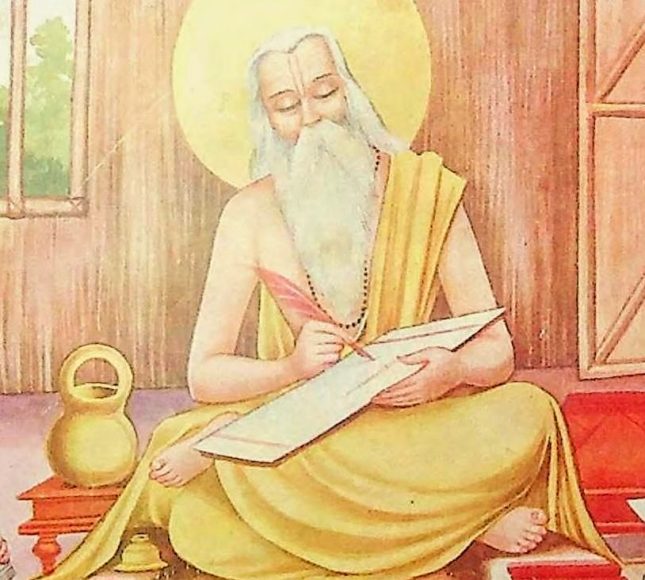BYASA (VYASA) The sage Byasa sings the Praises (of Guru Nanak Dev). He reflected on the Vedic Grammar. (Swayye Mahle Pahle Ke, p. 1390) Byasa narrates the sayings of Narada, ask Suka about it. (Maru Kabir, p. l J 03) Brahma, the son of Lotus (who sprang from the navel-lotus of Vishnu) and Byasa, the son of fish (fisher-woman Satyavati) performed austerities and became adorable. (Kama M. 4, p. 1309) Vyasa was a great Brahmin sage.
He was the son of the sage Parasara and Matsyodari (called Machhodari). His mother was bom of a fish, who had swallowed the semen of some sage. Parasara after his sexual contact with Machhodari named her as Yojana Gandhari (one whose body-fragrance spreads upto one Yojana i.e. about four miles). Yojana Gandhari was later on married to king Shantanu, the father of Bhishma Pitamaha and was named Satyavati. As mistress of Parasara, Yojana Ghandhari gave birth to Vyasa and as queen Satyavati she gave birth to two sons (both of them died young and childless).
Their widows namely Ambika and Ambalika through niyoga with Vyasa gave birth to the blind Dhritarashtra and Pandu. (See the entries Gangeva Pitama and Vidur). Vyasa performed great austerities in a forest and was also the father of the great sage Suka. He was a great author and compiler and is known as Veda Vyasa.
He is said to be the compiler of Mahabharata, the founder of Vedanta philosophy and the editor of the Puranas. In his works, he talks about the dynasties of the ancient kings and has recorded the sayings of many famous sages including Narada. His other name is Krishna Dwaipayana.
References :
1. Kohli, Surindar Singh ed, Dictionary of Mythological References in Guru Granth Sahib, 1993
Vyasa in Hindu Mythology
Vyasa, also known as Veda Vyasa or Krishna Dvaipayana, is one of the most revered sages in Hindu tradition. He is celebrated as the compiler of the Vedas and the author of the Mahabharata, one of the greatest epics in world literature. Here are some key aspects of Vyasa’s significance:
- Role as a Compiler:
- Vyasa is credited with dividing the single, vast Veda into four parts: Rigveda, Samaveda, Yajurveda, and Atharvaveda, making the sacred knowledge more accessible.
- He is also attributed with composing the Puranas, which include mythological stories, cosmology, and teachings.
Mahabharata:
- Vyasa is both the author and a character in the Mahabharata. He is the grandfather of the Kauravas and Pandavas and plays a pivotal role in the epic’s events.
- The Bhagavad Gita, a spiritual and philosophical discourse, is part of the Mahabharata and is considered one of Vyasa’s greatest contributions.
Guru Purnima:
- The festival of Guru Purnima is dedicated to Vyasa, honoring him as the ultimate teacher and sage.
Divine Incarnation:
- Vyasa is regarded as a partial incarnation (Amsa Avatar) of Lord Vishnu, sent to preserve and propagate dharma (righteousness). Vyasa in Sikh Scriptures
In Sikhism, Vyasa is acknowledged in the Guru Granth Sahib as a historical and symbolic figure. His role as a sage and compiler of sacred texts is referenced to convey spiritual lessons:
Mentions in the Guru Granth Sahib:
- Vyasa is mentioned in hymns to highlight the limitations of even great sages in fully comprehending the infinite divine. For example:
- “Brahma, Vishnu, and Vyasa contemplate the Lord, but they cannot find His limits” (Maru Kabir, p. 103).
- “Vyasa narrated the sayings of Narada, but the essence of the divine remains beyond words” (Swayye Mahle Pahle Ke, p. 1390).
Philosophical Context:
- Sikh teachings emphasize that while Vyasa’s contributions are monumental, true spiritual realization comes from meditating on God’s name (Naam) and living a righteous life.
- The Guru Granth Sahib often uses figures like Vyasa to illustrate the vastness of divine knowledge and the need for humility.
- Confluence of Traditions
Vyasa’s legacy bridges Hindu and Sikh traditions, serving as a symbol of wisdom, devotion, and the pursuit of truth. While Hinduism venerates him as a divine sage, Sikhism uses his story to emphasize the transcendence of the formless Creator (Ik Onkar).




